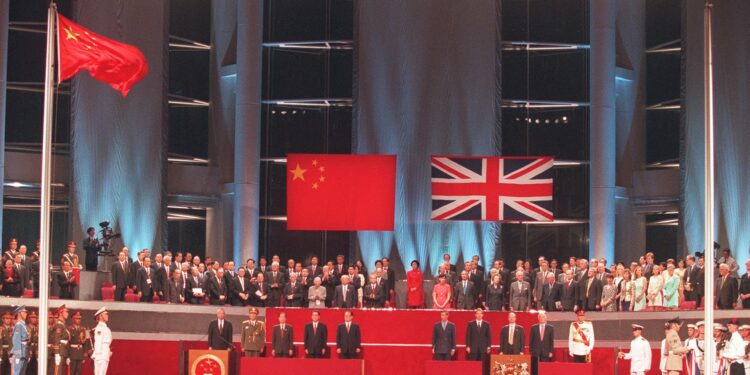The year 1997 marked a significant milestone in the history of Hong Kong as it returned to Chinese sovereignty after 156 years of British colonial rule. The handover of Hong Kong to China on July 1, 1997, represented the culmination of complex negotiations and symbolized a new chapter in the city’s political, social, and economic trajectory.
Under the Sino-British Joint Declaration signed in 1984, Hong Kong was to be transferred back to China with the principle of “one country, two systems” intact. This framework aimed to ensure Hong Kong’s high degree of autonomy, including the maintenance of its capitalist system, an independent judiciary, and civil liberties, for a period of 50 years. The concept of “one country, two systems” was intended to allay concerns about the potential erosion of Hong Kong’s freedoms under Chinese rule.
The handover ceremony itself was a momentous event. The last British governor of Hong Kong, Chris Patten, handed over the sovereignty of the territory to Jiang Zemin, the Chinese President at the time. The transition was marked by a mix of emotions, with some Hong Kong residents expressing hope for a prosperous future under Chinese rule, while others felt uncertain and anxious about the implications of the handover.
In the years following the handover, Hong Kong experienced both successes and challenges. The city maintained its status as a global financial hub and continued to flourish economically, benefiting from its strategic location and robust infrastructure. However, concerns began to emerge regarding the preservation of Hong Kong’s autonomy and civil liberties.
Tensions heightened in recent years, particularly with the introduction of the controversial National Security Law in June 2020. The law, imposed by Beijing, sparked widespread protests and raised concerns about the erosion of Hong Kong’s freedoms, including freedom of speech, assembly, and press.
The reverting of Hong Kong to Chinese sovereignty in 1997 marked a turning point in the city’s history. It brought an end to British colonial rule and opened a new chapter under Chinese administration. While the “one country, two systems” principle aimed to guarantee Hong Kong’s autonomy, the subsequent years have seen challenges to that promise. The future of Hong Kong remains uncertain, with ongoing debates about its political system, civil liberties, and relationship with mainland China.
Overall, the handover of Hong Kong in 1997 represented a significant moment in history, signifying the end of an era and the beginning of a new phase for the city. The journey of Hong Kong under Chinese sovereignty continues to evolve, with implications that extend far beyond the region itself.
newshub




Recent Comments